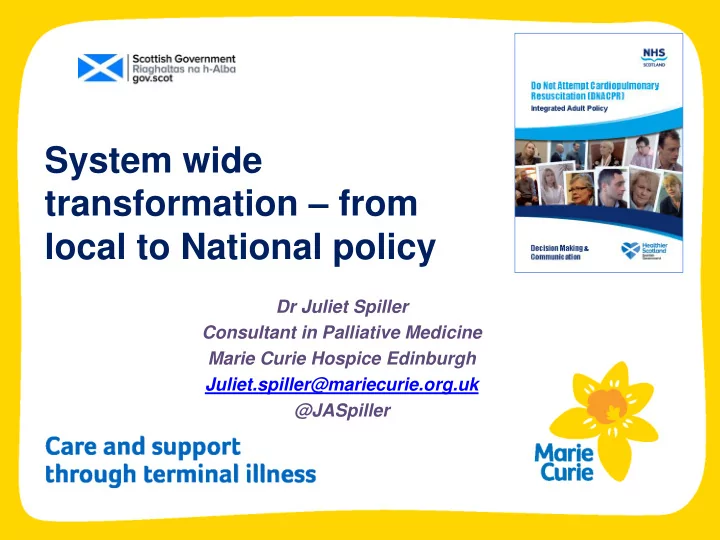

System wide transformation – from local to National policy Dr Juliet Spiller Consultant in Palliative Medicine Marie Curie Hospice Edinburgh Juliet.spiller@mariecurie.org.uk @JASpiller
Journey from local CPR policy to NHS Scotland DNAPCR policy and beyond….. Cardiopulmonary Resuscitation (CPR) – a practical skill, mandatory training for most clinical staff in most care settings Do Not Attempt CPR – NFR, DNR, DNAR, no consistent approach, a generalist issue, not talked about much in 2004! Why have Specialist Palliative care leadership for a generalist emergency issue?
“ Stay authentic but connect to wider picture as far as possible” • “Just letting you know your Acute hospital issue – CPR policy patient died this morning, we (DNACPR paragraph, white dot!) only shocked her the once….” • Scottish Ambulance Service Problem for us too – (eg DNACPR written on canteen napkin) “His wife was so upset! It just wasn’t right to take his body to • GPs & District Nurses – families who call the police morgue so I stayed all 999, patients who want to die at home night til the GP came at 8.30am • Police Officers – Sudden Death Guidance • Care Home issue – “blanket” DNACPR policies “The doc phoned me to say Mum was or blanket “call 999” policies in from the care home with a chest infection and if her heart stopped did • Patient and carer issue – medicalised I think they should restart it – I felt death, no or poor communication etc like I had given mum a death sentence
Why have Palliative care leadership for generalist emergency issue? DNACPR - not a palliative care specific issue but is relevant for every patient with identified palliative care need in every care setting Remember 1 in 3 patients in the acute……. Prevalence study in-patients in 25 Scottish hospitals (n=10,743) 10% died during their current admission 29% died within 12 months Clark et al ( 2014) Imminence of Death Among Hospital In-Patients Pall Med 28(6)474-9
Evolution of a National DNACPR policy 2004 – CPR policy review St John’s Hospital Livingston 2006 – Integrated DNAR policy NHS Lothian 2008 – Living & Dying Well (National Action Plan for PEoLC in Scotland) 2008 – Scottish Government Public Audit Committee recommendation 2010 – Integrated Adult NHS Scotland DNACPR policy and Children and Young Person’s Acute Deterioration Management Plan (CYPADM) 2014 – Tracey v Cambridge University Hospitals Trust – judgement 2014 – start of “light touch review” of NHS Scotland DNACPR policy 2014 – revised CPR decision-making BMA/RCN/RC(UK) guidance 2015 – start of work on Emergency Care and Treatment Plans 2015 – Winspear vs Sunderland NHS Foundation Trust – judgement 2016 – revised CPR decision-making BMA/RCN/RC(UK) guidance 2016 – revised NHS Scotland DNACPR policy
National policy + education + audit + QI Regional policy + education + audit Naming of mismatch between good practice guidance and local practice (single hospital)
and then when you think you are at Scottish input to national good practice the summit………………. Media / comms strategy guidance (GMC, BMA/RCN/RC(UK) Advance & Anticipatory Care Incapacity legislation Planning Care Homes Police Research NHS 24 First responders Legal changes “Deteriorating Patient” – Scottish Patient Safety Priority NHS Education for Scotland online modules, eHealth and digitisation overlapping workstreams
DNACPR Policy EDUCATION EQUITY Patients, carers, clinical staff, Postcode, diagnosis, culture etc volunteers, social carers, care home staff, police etc HEALTH LITERACY – trust, empowerment, IDENTIFICATION of enabling palliative need - ANTICIPATORY CARE SPICT, SPARRA etc PLANNING National ACP, Key Information RESEARCH – what works, patient experience, Summary, carer experience, sharing good practice ReSPECT etc
Messaging and Health Literacy “ Health literacy is about people having enough knowledge, understanding, skills and confidence to use health information, to be active partners in their care, and to navigate health and social care systems.” www.healthliteracyplace.org.uk Perceptions of palliative care Collins et al PallMed 2017, Vol 31 (9): 825-832 • diminished possibility • diminished choice – forced upon you by the healthcare system when no other choices remain • place to wait for death, • end to earlier hopes for survival & increasing dependency on others for care.
Messaging and Health Literacy Loud Media messaging about DNACPR • Cost cutting • Clearing blocked beds • Doctors and nurses playing God • Having a treatment that would save your life withheld to save money Health Literacy aim - bring patient and caregiver understandings in line with the evidence for what ‘good quality care’ really means in the context of serious illness (#RealisticMedicine) WIFE’S FURY AT ORDER TO ENSURE NATURAL, PEACEFUL AND DIGNIFIED DEATH AT HOME …… ……doesn’t have quite the same headline impact!!!
Don’t lose sight of who will benefit when a problem is solved “Before NHS Scotland implemented the policy, there would be around 50 times every year when out of hospital expected deaths were dealt with inappropriately. Since the policy was implemented, and SAS produced its own associated policy, these have been largely eradicated. The effects on bereavement and recovery have been incalculable .” Clinical Performance Manager Scottish Ambulance Service
System wide transformation leadership - working with Pandora’s box Containment Coherence Connections Collaboration www.comixgamer.deviantart.com
“This case was never really about the Communication decision- making process, that didn’t – last word goes to a family carer …… really come up at all. It was - why didn’t they talk to my mum . Why didn’t they explain to her what was possible? Why didn ’ t she get the chance, when she so desperately wanted it, to talk about what was going to happen?” Kate Masters – daughter of Janet Tracey – explaining why her dad pursued the case against Cambridge University Hosp Trust
www.cartoonstock.com Juliet.spiller@mariecurie.org.uk @JASpiller
Recommend
More recommend